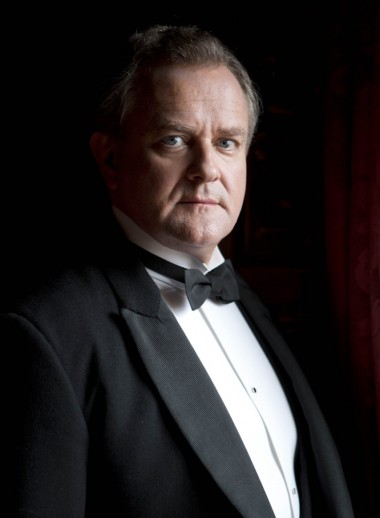Interview by Jane Graham for The Big Issue
Hugh Bonneville gets to grips with Lord Grantham, and talks about life after Downton Abbey
The last couple of years have been good to Hugh Bonneville. He’s been working steadily in British theatre, films and TV for over two decades, from the time his boyhood dream came true and he secured a place at his beloved Royal Shakespeare Company.
But just two years ago it would have been fair to say he was still best known for the loveable buffoon he made out of Hugh Grant’s pal, Bernie, in Richard Curtis’ 1999 feelgood, fuzzy Notting Hill.
As delightful a creation as the baby-faced, self-deprecating Bernie was, he’s near-forgotten now, an obscure relic from the distant Before Downton era. Because in the time of Downton Abbey, 49-year-old Hugh ‘Lord Grantham’ Bonneville has become one of the most familiar faces in Britain. And he’s loving every moment of it.
“It’s a complete privilege to work on Downton Abbey with such great actors and with the words of a great writer like Julian Fellowes,” he tells me, sitting in the London hotel he’s been confined to for the day. He admits the 10-hour interview conveyor-belt experience can be a drag, but his warmth and patience would impress even the impeccably mannered Grantham.
“And it’s wonderful to be part of so many people’s Sunday nights across the country. I really appreciate the show’s following but it makes me very cautious to say anything about the plot. I know these interviews go round the world and I’m determined not to spoil things.”
He’s right to be careful. A quick glance at Twitter and you’ll see Downton fans come a close second to Doctor Who enthusiasts for their fierce passion and guerrilla-style mission against spoilers. It’s for Bonneville’s own good that I don’t press him on the Granthams’ Christmas tree colour scheme – I learned my lesson when Dan Stevens (aka cousin Matthew) was profligate with such details in The Big Issue last year – but one thing we are free to discuss is his feelings about Lord Grantham himself. And he’s surprisingly harsh on the old bugger, despite owing his first Golden Globe and Emmy nominations to him.
“I think he’s entirely lost touch with the outside world, put it that way,” he says with no little contempt. “His feet are stuck in the mud. His principled stand on so many things, based on his background and his position in life, make me want to grab him and throw him around and say ‘Get real’. He’s a lousy character witness; he helped get his valet sent down. He’s a lousy financial adviser, putting his eggs all in one basket. And he made a fairly critical call on medical terms, which ended in the death of his daughter.”
And then, after that devastating character assassination: “But I can’t help liking him obviously.” He laughs uproariously. “I’m told he’s partly based on Julian Fellowes’ actual father, though he’s a brighter man than Grantham. He’s caught up in the mores of his time and at the hands of his mother – a very feisty creature – so he hasn’t had a lot of time to break free of his shackles.
“He wouldn’t know how to, bless him. You have to feel a bit sorry for him. He’s a dying breed and he’s just beginning to understand that. He’s been feeling rudderless. He had that tussle with the maid. People say he wouldn’t do that – well, certain leaders of certain countries have done worse. Human beings do. They’re contradictory.
“Julian loves those kinds of shifts, when good or bad characters take you unawares. All human nature is on display on the show and Julian has great fun teasing us about what’s going to happen next.”
‘What happens next’ is the dynamic which keeps the Downton chatter lively in those draughty months when it’s not on the telly. Fans clamour for a crumb of a hint, and even the cast speak of rushing through new scripts holding their breath. Gossip that Dan Stevens is off to LA and will be written out next year is rife, but the headline rumour the tabloids run every few months is that Maggie Smith, who plays the forbidding beady-eyed Dowager Countess, is leaving the show. For Bonneville particularly, this would be sad news. He loves talking about Downton but he positively gushes about Dame Maggie.
“Maggie Smith has been a feature on my dramatic horizon my entire life, truly,” he says. “So to be working alongside her so closely is remarkable.”
We discuss the scene the morning after the death of the Dowager Countess’ grand-daughter, Sybil, in which the Dowager, marching through the house alone, stops to lean against a wall, her body suddenly limp, her shoulders trembling. The emotional impact of seeing this formidable woman fail, just for a moment, to keep up the stoic appearance, so important to her sense of self, made it one of the most talked about scenes in the show’s history.
“That was a perfect bit of TV, I thought,” agrees Bonneville. “There’s nothing more telling than seeing characters on their own, when no one else is around. To see her have that little private moment was worth a hundred lines of dialogue. It told you so much. Very few actors could have pulled that off, released such emotion in the audience.
“I knew what was coming and it still got me. To work alongside her, watching her character try to corral the family into some sense of unity in grief, the simple elegance with which she delivered that scene, both on the day and then watching it on TV… you can’t define what makes someone great, but she is.”
Bonneville was born in London to a tree-surgeon father and nurse mother. His biography – joined the National Theatre as a child; read theology at Corpus Christi College, Cambridge, where he was taught by the former Archbishop of Canterbury, Dr Rowan Williams; called his son Felix – is somehow exactly what you’d expect from a man who has mostly made his career out of playing rather awkward class-locked men, either bumbling Hugh Grant types or stiff, fusty, unyielding aristocratic ones.
In person, however, he’s supremely confident, spirited and gleefully sweary. Having worked with the two writers most responsible for exporting those particularly buttoned-up images of Englishness overseas – Julian Fellowes and Richard Curtis – does he like the idea he’s played a part in establishing such notions of his countrymen?
“I’m not sure,” he says. “I don’t think I’m quintessentially anything. I was born a Sassenach, south of the Watford Gap, so what does that make me? I have a bit of Irish and Welsh in me and I think there’s some Scots somewhere. I feel British. It’s probably true that, rightly or wrongly, those two writers have painted a certain picture of who we are and what we’re like, which has gone round the world.
“Americans probably thinks we sit around in big country houses drinking tea all the time. We’re not – we know that – and as long as we’re comfortable with that it doesn’t really matter what other people think.
“I can’t imagine Shane Meadows hiring me in a million years but I think his work is remarkable and wonderful, a very true account of a certain part of England. Richard Curtis and Julian Fellowes give a heightened version of a certain kind of Englishness.
“They’re all valid; Mike Leigh as well. I’d love to do something very different next. What I’m really after right now is a zombie rom-com. I may be pigeonholed as a bloke with a labrador for the rest of my life but I hope not.”
Of course, while he’s been a gift to Bonneville, the bloke with the labrador is not loved by all. But for every 10 people who love Downton Abbey, there’s likely to be someone else who relished every moment of Bonneville’s other storming success this year: the dry, satirical, spoof documentary about the Olympic organisers, Twenty Twelve.
The show began as a rather obscure little gem on BBC Four but wildfire word of mouth saw it quickly ushered on to BBC Two and it leads the way in the just-announced nominations for the British Comedy Awards, taking place on December 12 (Bonneville is up for Best Actor).
Bonneville played head of deliverance Ian Fletcher, an upright chap desperately trying to keep things afloat while slowly drowning in a sea of incompetence, miscommunication and nonsensical management speak. At the mere mention of Fletcher’s name, Bonneville starts laughing.
“I loved doing Twenty Twelve, mainly because of the lunatics around Ian, and him trying to be normal, put a brave spin-doctor’s face over things as the juggernauts of doom approached.”
He pauses. “I do seem to play a lot of men in charge of sinking ships. But if I’m honest I’d probably have more fun in a pub with Ian Fletcher than I would with Lord Grantham. At least you could get a game of darts. Though Ian is a man always aware of health and safety, of course. He doesn’t push the boat too far out. He’d love to say it’s all a load of old shit, let’s get on with it, but he won’t.”









